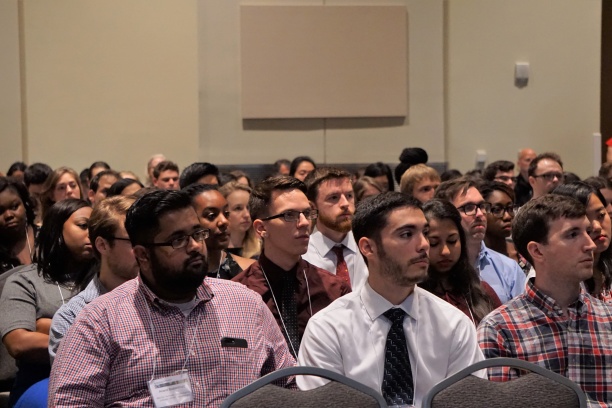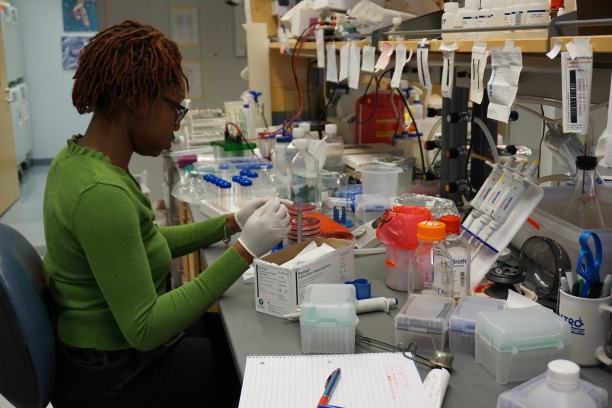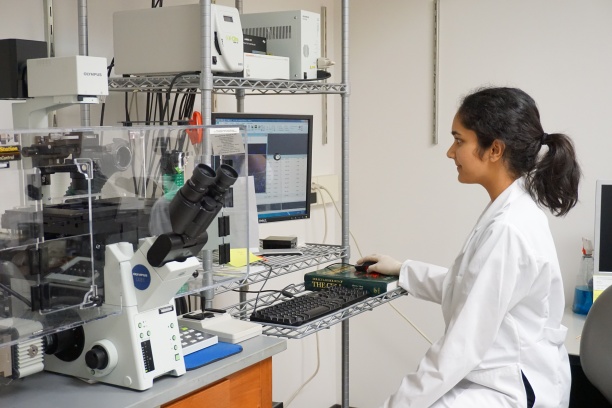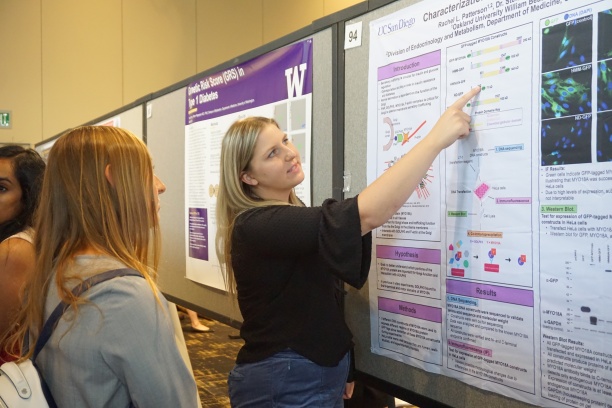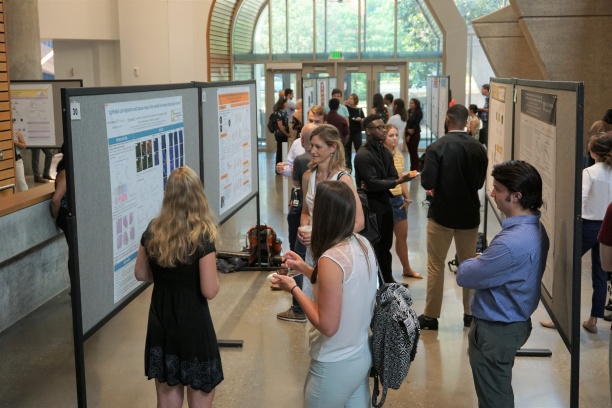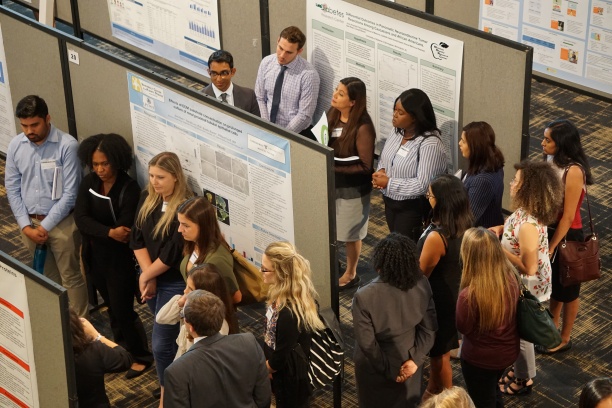The Vanderbilt Medical Student Research Training Program (SRTP) is sponsored by the National Institutes of Health and allows medical students to conduct research under the direction of an established scientist in the areas of diabetes, obesity, kidney disease or digestive disease at Vanderbilt during the summer between the first and second or second and third years of medical school. |
SRTP offers three areas of emphasis:
- Diabetes and Obesity
Research areas include pancreatic islets/insulin secretion, neuroscience related to obesity and diabetes, carbohydrate physiology, hormone action/signal transduction, immunology related to diabetes, complications of diabetes, exercise physiology, and patient education or behavior related to diabetes. - Kidney Disease
Research areas include diabetic nephropathy, immune-mediated kidney disease, kidney fibrosis, hypoxia and cellular signaling, metabolism and inflammation in acute and chronic kidney disease, and psychosocial aspects of kidney disease. Students selected for this program will participate in the Vanderbilt Center for Kidney Disease Student Research Training Program in Kidney Disease; click here for more information. - Digestive Disease
Research areas include epithelial integrity, gastrointestinal development and function, gastrointestinal physiology, inflammatory bowel disease, Helicobacter pylori infection, and GI-related cancer.
PROGRAM OVERVIEW
- Students spend 2-3 months at Vanderbilt University Medical Center and receive a stipend of approximately $2,300 per month.
- Students must participate for a minimum of two calendar months (60 days) between late May and August and participate in the research symposium at Vanderbilt.
- Program staff will assist students in selecting an appropriate research project and preceptor. Prior research experience is not required. In addition to working on his/her own research project, each student attends a series of seminars addressing various clinical and research aspects of diabetes mellitus and its complications, kidney disease, and digestive disease.
- Mentors will be matched to students based on availability and research interests. Most projects are basic science and bench research.
- MD and DO students are eligible to apply.
SRTP 2025 Application Deadline: Jan. 5, 2026, 11:59 p.m. local time 🗂 APPLY HERE
Click here to view SRTP alumni and their affiliations.
ADDITIONAL DETAILS:
-
The objectives of the Vanderbilt Medical Student Research Training Program (SRTP) are:
- To provide the opportunity for the student to conduct diabetes and obesity-related research, kidney and hypertension-related research, or digestive disease-related research in order to gain an improved understanding of research and career opportunities in biomedical research
- To provide an atmosphere that encourages and facilitates student interaction with a varied group of established investigators and clinicians
- To give participants a comprehensive and current understanding of diabetes mellitus, its clinical manifestations and its unsolved problems

Read here: Impact of Medical Student Research in the Development of Physician-Scientists The SRTP started in the summer of 1975 and during the past 46 years over 1,000 students from more than 120 medical schools have participated. Each summer approximately 30 medical students participate in the program (see below section for a list of recent alumni). Each student chooses an established Vanderbilt investigator in the field of Diabetes, Obesity, Kidney Disease or Digestive Disease. The areas of research are quite broad and range from basic laboratory studies to clinical studies in humans. Program staff will assist students in selecting a preceptor. The Vanderbilt faculty member and the medical student jointly design a research project, which is then conducted over the course of the summer.
At the conclusion of the summer, students present a brief summary of their work in a national research symposium. In addition to working on their own research projects, students attend a series of seminars addressing various clinical and research aspects of diabetes mellitus and its complications, kidney disease and hypertension, and digestive disease. Through these seminars, Vanderbilt faculty alert students to recent advances in basic and clinical research and treatment options.
Each student receives a stipend (currently calculated at a rate of approximately $2,300 per month) from which expenses for housing may be paid. The stipend amount is prorated based upon the actual number of days a student participates in the program. Students are expected to spend 2-3 months in the program.
Please note that students must be U.S. citizens or permanent residents to participate in this program.
-

Program Director
Diabetes and Obesity
Emphasis Area Co-Directors
Kidney Disease

Kidney Disease

Digestive Disease
-
Diabetes and Obesity Track
Cell Signaling
Faculty Name Research Interest Affiliation(s) Breyer, Richard Prostaglandin E2 receptor signaling Medicine; Nephrology Collins, Sheila Biochemistry of metabolic disease Medicine Davies, Sean Oxidative stress Pharmacology Clinical Research, Genetics and Epidemiology
Faculty Name Research Interest Affiliation(s) Biaggioni, Italo Role of the autonomic nervous system in hypertension and obesity Clinical Pharmacology Cox, Nancy Genomics Medicine Elasy, Thomas Relapse prevention in diabetes Medicine Giri, Ayush Women's health in diabetes/obesity Medicine Heerman, Bill Childhood obesity and behavioral interventions Pediatrics Jaser, Sarah Risk factors and interventions in T1D Pediatrics Jasper, Elizabeth Reproductive epidemiology, genetic epidemiology, and women's and maternal-child health Obstetrics and Gynecology Luther, Matt Aldosterone and islet function Medicine; Clinical Pharmacology Mayberry, Lindsay Diabetes patient support interventions Medicine Mulvaney, Shelagh Improvement of self-management of diabetes Nursing; Pediatrics Rothman, Russell Patient education in diabetes Medicine Roumie, Christianne Epidemiology in pediatric diabetes Medicine Russell, William ERB signaling in liver regeneration Pediatrics Schlundt, David Environmental influences on diabetes and obesity Psychology Yu, Danxia Nutritional and molecular epidemiology Medicine Complications Related to Diabetes
Faculty Name Research Interest Affiliation(s) Brantley, Milam Diabetic retinopathy Opthalmology Chaum, Ed Diabetic retinopathy Opthalmology De La Huerta, Irina Diabetic retinopathy Opthalmology Fogo, Agnes Glomerulosclerosis-vascular changes Pathology Guelcher, Scott Biomaterials for orthopaedic surgery Biomolecular Engineering Levine, Ed Cellular and molecular mechanisms in retinal development and retinal disease Opthalmology Linton, MacRae Animal models of atherosclerosis Medicine Vickers, Kasey microRNA communication and systemic homeostasis Medicine Zent, Roy Cell-extracellular matrix interactions in kidney Medicine; Nephrology In Vivo Metabolic Regulation and Obesity
Faculty Name Research Interest Affiliation(s) Abumrad, Naji Obesity/bariatric surgery Surgery Avison, Malcolm CNS development and function Pharmacology Ayala, Julio Gut-brain interactions in energy balance Molecular Physiology & Biophysics Flynn, C. Robb Diabetes and bariatric surgery Surgery Gamboa, Alfredo CNS and blood pressure Medicine; Clinical Pharmacology Gregory, Justin Insulin resistance Pediatrics Hulgan, Todd Translational mitochondrial genomics in HIV Medicine Koethe, John Adiposity and immune activation Medicine Mashayekhi, Mona Chronic inflammation in individuals with obesity and cardiometabolic diseases Medicine McGuinness, Owen Metabolism and nutritional support in vivo Molecular Physiology & Biophysics Shibao, Cyndya Hypertension and hypotension in diabetes Medicine; Clinical Pharmacology Shoemaker, Ashley Pseudohypoparathydroidism Pediatrics Silver, Heidi Diet and obesity Gastroenterology, Hepatology & Nutrition Simerly, Richard Brain and physiology metabolic regulation Molecular Physiology & Biophysics Stafford, John Obesity and lipid metabolism Medicine Wasserman, David Metabolism and exercise Molecular Physiology & Biophysics Young, Jamey Obesity and metabolic disorders Molecular Physiology & Biophysics Islet Development, Biology, and Immunology
Faculty Name Research Interest Affiliation(s) Aune, Thomas Type 1 diabetes genes/regulating T cells Medicine; Rheumatology Bellan, Leon Microfluidics Mechanical Engineering Bonami, Rachel Islet autoantibodies as biomarkers Medicine; Rheumatology Cha, Jeeyeon Sexually dimorphic responses of islet cells Medicine Chen, Wenbiao Metabolism, pancreatic islet development Molecular Physiology & Biophysics Dean, Danielle Alpha cell proliferation and dysfunction in diabetes Medicine Gannon, Maureen Molecular and cell biology of pancreas development Medicine Jacobson, David Pancreatic islet and hormone secretion Molecular Physiology & Biophysics Kaverina, Irina Microtubule-actin cytoskeleton interplay and cell motility Medicine Kirabo, Annet Immunology of cardiovascular disease and hypertension Medicine; Clinical Pharmacology Magnuson, Mark Stem cell biology Molecular Physiology & Biophysics Moore, Daniel Loss of immune tolerance in type 1 diabetes Pediatrics; Endocrinology O'Brien, Richard Gene regulation by insulin; islet gene expression Molecular Physiology & Biophysics Powers, Alvin Pancreatic islet function and growth Medicine Wright, Christopher Pancreas development Cell & Developmental Biology Wright, Jordan Pathophysiology of islets Medicine Digestive Disease Track
Faculty Name Research Interest Affiliation(s) Abumrad, Naji Mechanisms involved in improved glucose handling following bariatric surgery Surgery Beauchamp, R. Daniel Colorectal carcinogenesis, biology of cancer cell invasion and metastasis, identification of novel molecular biomarkers Surgery Coffey, Robert Role of EGF receptor and its ligands in epithelial cell growth, differentiation and neoplasia Medicine Cover, Timothy Bacteria-host interactions, bacterial toxins, Helicobacter pylori, gastric cancer Medicine El-Rifai, Wael Cancer genetics, molecular biology, upper gastrointestinal cancer, Barrett's adenocarcinoma, gastric cancer Surgery Fingleton, Barbara Therapeutically targeting inflammatory molecules in colitis and colon cancer Cancer Biology Gannon, Maureen Genes and signaling pathways involved in development and function of pancreatic cells Medicine Goettel, Jeremy Mechanisms regulating intestinal immunity Medicine; Pathology, Microbiology, and Immunology Goldenring, James Vesicle trafficking and recycling pathways that regulate function of apical membrane specializations in polarized kidney and gastrointestinal epithelial cells Surgery Hasty, Alyssa Obesity-related increases in adipose tissue macrophages leading to inflammation and insulin resistance Molecular Physiology & Biophysics Lee, Ethan Mechanism of Wnt signal transduction in development and disease Cell & Developmental Biology Olivares-Villagomez, Danyvid Mucosal immunology, intestinal intraepithelial lympocytes, cytokine osteopontin signaling Pathology, Microbiology, and Immunology Peek, Richard Pathogenesis of Helicobacter pylori infection and gastric cancer Medicine Singh, Bhuminder Receptor tyrosine kinases in epithelial homeostasis and colorectal cancer Medicine Van Kaer, Luc Antigen presentation and lymphocyte development Pathology Wasserman, David Pathogenesis of insulin resistance in liver and muscle Molecular Physiology & Biophysics Williams, Christopher Epigenetic control of intestinal epithelial wound healing and repair programs and relationship to colorectal oncogenesis Medicine Wilson, Keith Mucosal immunology, mechanisms of inflammation, oxidative stress and gastrointestinal carcinogenesis, host-pathogen interactions Medicine Zachos, Nicholas Organoids in the pathophysiology of GI disorders Surgery; Cell & Developmental Biology
